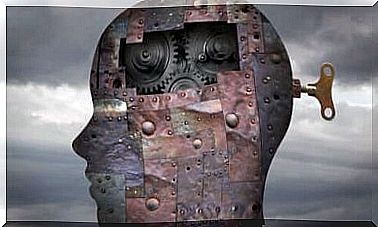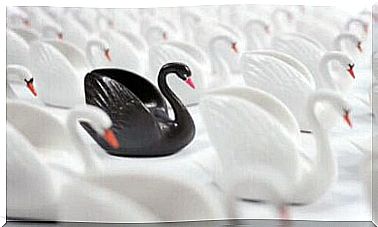Atelophobia, The Fear Of Being Imperfect

Today, perfectionism is seen more as a virtue than a flaw. But can the pursuit of perfection become unhealthy and irrational? Indeed, it is possible. When perfectionism becomes crippling, you can experience atelophobia, a mental illness related to anxiety disorders.
Atelophobia is the fear of being imperfect, of not doing things right, of not being good enough. It occurs when a person’s perceived expectations do not match reality. It is an irrational and obsessive form of perfectionism that can lead to crippling inaction and cause many stress-related health issues.
Due to atelophobia, the person cannot have cues. His relationships are seriously affected. In addition, when the person realizes that they have not achieved their goal, it is normal for them to feel overwhelmed by negative emotions.
A person with atelophobia has a panic fear of making mistakes, of making mistakes without realizing it. Thus, the simplest task can become torture due to the degree of resources that those suffering from this pathology devote to its supervision. They therefore take little or no risk.
There are many psychological symptoms that we can identify as hallmarks of atelophobia, such as frequent avoidance behaviors, feelings of helplessness, extreme anxiety and fear, fear of losing control, confusion, l irritability and lack of concentration. Physical symptoms such as rapid breathing, frequent drying of the mouth, palpitations, nausea, headache, or excessive sweating may also occur.

The causes of atelophobia
No one knows the real cause of atelophobia. It could be a genetic propensity or a traumatic event. However, it seems that in most cases it is an acquired reaction that begins at an early age and, with age, intensifies and becomes chronic.
Atelophobia is a specific phobia focused on key non-social factors. Some phobias tend to be caused by previous trauma, often occurring in childhood and affecting the physical integrity of the affected person.
Education can also play an important role in the development of atelophobia, such as parental warning of a direct threat, which is especially noticeable in cases where the threat is more imminent (allergies or insect attacks, for example).
Also, it is believed that genetics and hereditary factors may play a role in specific phobias, particularly those related to the danger of injury. For example, a primary “fight or flight” reflex may be triggered more easily in those with a genetic predisposition.
In all types of phobias, external experiences or relationships can reinforce or develop the fear, such as seeing a family member or friend affected; in extreme cases, the indirect exposures can be as varied and distant as hearing a reference in a conversation or learning about a particular piece of news.
Atelophobia, like most phobias, arises from a subconscious overprotective mechanism and, as is the case with many phobias, can also be rooted in unresolved emotional conflict. Demanding parents who accept nothing but perfection and overly strict teachers can become central triggers of future mental disorders, including fear of falling short.
The difference between atelophobia and perfectionism
Atelophobia has a lot to do with perfectionism, but it’s not the same thing. There is a fundamental difference between the two concepts. It is true that people who suffer from atelophobia often make perfection their goal and do not achieve it just because it is impossible.
But atelophobia isn’t just about setting high standards. The problem is, this phobia paralyzes and blocks reinforcement instead of motivating. Many perfectionists respond to anxiety by working harder. People with atelophobia choose inaction to avoid possible failures.
In addition, perfectionism often manifests itself in a desire for personal achievement and success. This vision, even if it has its drawbacks, can make a person better and allow him to be fulfilled. However, atelophobia does not like this point either.

Concluding observations
Learning to aspire to “good enough” is a quality that often generates well-being. In this regard, author Olga Khazan writes: “ It can be difficult in our culture to force ourselves to be content with ‘good enough’. But when it comes to happiness and satisfaction, ‘good enough’ isn’t just good, it’s perfect ”.
The perfection found in atelophobia becomes a threat that a person can hardly escape. In fact, it usually causes paralysis which ends with any attempt to reach a certain goal. Not only does this setting generate frustration, but it is also very destructive for the self-esteem of the person, the very one who feels overwhelmed and trapped in his own fear.










